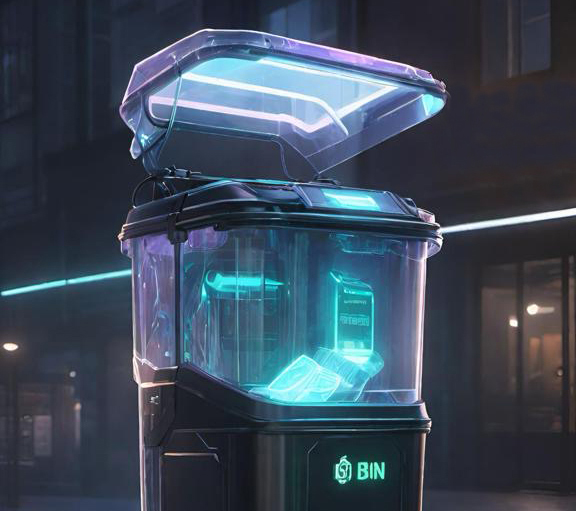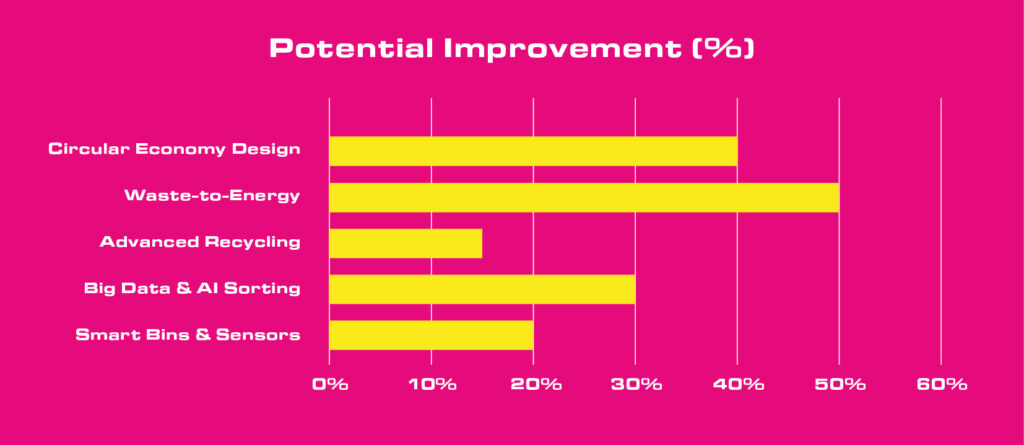The global waste crisis is undeniable. With over 2 billion tonnes generated annually and associated costs reaching nearly £300 billion, traditional waste management approaches are struggling to keep pace. Here in the UK, we face similar challenges, yet a glimmer of hope shines through – innovation. By leveraging cutting-edge technology, the waste management and recycling sector is poised for a transformation, paving the way for a more sustainable future.
A Global Industry on the Rise
The global waste management industry is a behemoth, valued at an estimated $1.6 trillion in 2020 and projected to reach $2.5 trillion by 2030. This 68.75% growth is fuelled by factors like improved waste collection in developing economies (expected to reach 50% by 2050 according to the World Bank) and the sheer volume of waste generated across the globe.

The UK itself is a significant player, with Veolia Environmental Services UK and Biffa Group reporting annual revenues of £3.3 billion and £1.4 billion respectively for the year ending 2022.
However, the current system isn’t without its flaws. The global waste trade, while seemingly efficient, often masks a darker reality. Statistics show a significant decline in plastic waste exports since China’s “National Sword” policy – down from over 15 million tonnes in 2010 to around 4.45 million tonnes in 2021. This highlights the need for a domestic solution and a shift towards a more circular economy.
The UK’s Waste Management Landscape
Within the UK, waste management is segmented into three main categories: municipal solid waste (household waste), industrial waste, and hazardous waste. Each requires specialised handling and disposal methods. While collection rates are high – with Biffa alone collecting over 4 million metric tonnes in 2022 – disposal methods vary greatly. Recycling rates in the UK, although improving, still show disparity between regions, with Wales leading the way at 57% compared to England’s 44%. This gap presents an opportunity for significant improvement.
Tech-Powered Solutions: A Global Revolution
The tide is turning. Around the world, waste companies are embracing technology to revolutionise waste management. San Francisco’s Recology utilises robotic sorting with AI and sensors to achieve an impressive 87% recycling rate. South Korea’s Songdo City leverages an underground pneumatic waste system for efficient transportation and sorting. Waste Management, a North American giant, employs “Smart Bins” with sensors and AI-powered recycling programmes to incentivise participation and improve sorting efficiency.
The graph below displays the potential improvement percentage for various waste management technologies. It reveals that Waste-to-Energy technologies have the greatest potential impact, with a possible improvement of up to 50%. Circular Economy Design and Big Data & AI Sorting are predicted to achieve improvements between 30-40%, while Smart Bins & Sensors and Advanced Recycling could potentially reach 20-30% improvement.

The UK’s Technological Opportunity
The UK has a unique chance to become a global leader in sustainable waste management. Here’s how technology can empower this transformation:
Investing in Cutting-Edge Technologies: Early adoption of advanced sorting, recycling, and waste-to-energy plants will position UK companies at the forefront of the industry. This could potentially lead to a market share increase of 10-15% in the next five years.
Data-Driven Decision Making: Utilising big data and analytics can optimise operations and track progress towards sustainability goals (with a target of achieving a 10% annual reduction in landfill waste).
Building a Collaborative Ecosystem: Collaboration with government agencies to create policy frameworks that incentivise innovation through tax breaks or subsidies (potentially reaching a 20-25% cost reduction) and promoting responsible practices is crucial.
Empowering Informed Consumers: Public awareness campaigns that target a 20% increase in knowledge about responsible waste disposal habits and the importance of recycling are essential.
Leading the Charge: From Waste Collectors to Waste Warriors
By embracing innovation, fostering partnerships, and educating the public, UK waste management companies have the power to transform themselves from waste collectors into environmental stewards, leading the charge towards a cleaner and more sustainable future for the UK. This is not just about managing waste – it’s about reimagining the entire waste management lifecycle, creating a greener future for generations to come.
The Opportunity is Now: A Call to Action for UK Businesses
At Circulai, we believe that technology is the key to unlocking a future where waste becomes a resource, not a burden. Our solutions are uniquely crafted with AI and machine learning to optimise waste collection, sorting, and processing thereby laying the foundation for a transformative business model tailored to market segments facing the challenge of balancing ethical practices with profitability.
Contact us to learn how Circulai is harnessing technology to revolutionize the waste management sector in the UK. Together, let’s build a cleaner, more sustainable future.


